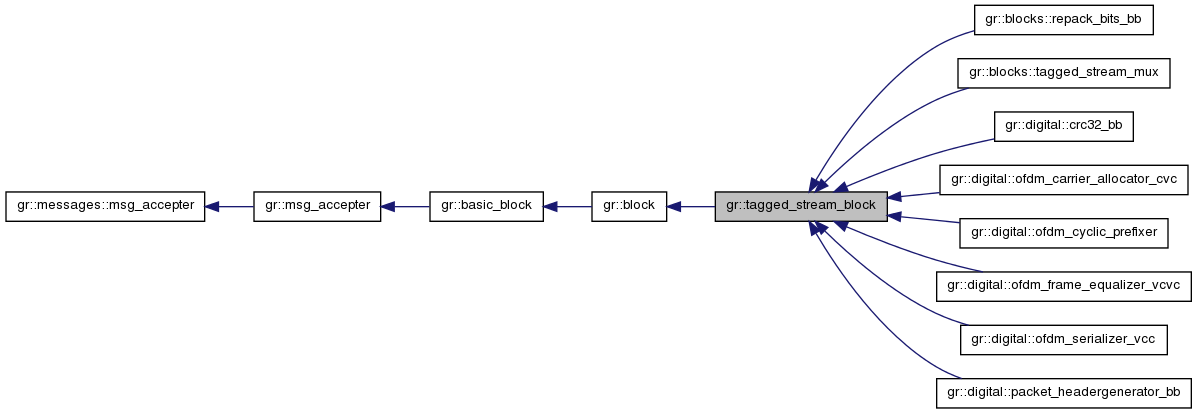Block that operates on PDUs in form of tagged streamsOverride work to provide the signal processing implementation. More...
#include <tagged_stream_block.h>

Public Member Functions | |
| void | forecast (int noutput_items, gr_vector_int &ninput_items_required) |
| Don't override this. | |
| int | general_work (int noutput_items, gr_vector_int &ninput_items, gr_vector_const_void_star &input_items, gr_vector_void_star &output_items) |
| virtual int | work (int noutput_items, gr_vector_int &ninput_items, gr_vector_const_void_star &input_items, gr_vector_void_star &output_items)=0 |
| Just like gr::block::general_work, but makes sure the input is valid. | |
Protected Member Functions | |
| tagged_stream_block (void) | |
| tagged_stream_block (const std::string &name, gr::io_signature::sptr input_signature, gr::io_signature::sptr output_signature, const std::string &length_tag_key) | |
| virtual void | parse_length_tags (const std::vector< std::vector< tag_t > > &tags, gr_vector_int &n_input_items_reqd) |
| Parse all tags on the first sample of a PDU, return the number of items per input and prune the length tags. | |
| virtual int | calculate_output_stream_length (const gr_vector_int &ninput_items) |
| Calculate the number of output items. | |
| virtual void | update_length_tags (int n_produced, int n_ports) |
| Set the new length tags on the output stream. | |
Protected Attributes | |
| std::string | d_length_tag_key_str |
Detailed Description
Block that operates on PDUs in form of tagged streams
Override work to provide the signal processing implementation.
Constructor & Destructor Documentation
| gr::tagged_stream_block::tagged_stream_block | ( | void | ) | [inline, protected] |
| gr::tagged_stream_block::tagged_stream_block | ( | const std::string & | name, |
| gr::io_signature::sptr | input_signature, | ||
| gr::io_signature::sptr | output_signature, | ||
| const std::string & | length_tag_key | ||
| ) | [protected] |
Member Function Documentation
| virtual int gr::tagged_stream_block::calculate_output_stream_length | ( | const gr_vector_int & | ninput_items | ) | [protected, virtual] |
Calculate the number of output items.
This is basically the inverse function to forecast(): Given a number of input items, it returns the maximum number of output items.
You most likely need to override this function, unless your block is a sync block or integer interpolator/decimator.
| void gr::tagged_stream_block::forecast | ( | int | noutput_items, |
| gr_vector_int & | ninput_items_required | ||
| ) | [virtual] |
Don't override this.
Reimplemented from gr::block.
| int gr::tagged_stream_block::general_work | ( | int | noutput_items, |
| gr_vector_int & | ninput_items, | ||
| gr_vector_const_void_star & | input_items, | ||
| gr_vector_void_star & | output_items | ||
| ) | [virtual] |
- Reads the number of input items from the tags using parse_length_tags()
- Checks there's enough data on the input and output buffers
- If not, inform the scheduler and do nothing
- Calls work() with the exact number of items per PDU
- Updates the tags using update_length_tags()
Reimplemented from gr::block.
| virtual void gr::tagged_stream_block::parse_length_tags | ( | const std::vector< std::vector< tag_t > > & | tags, |
| gr_vector_int & | n_input_items_reqd | ||
| ) | [protected, virtual] |
Parse all tags on the first sample of a PDU, return the number of items per input and prune the length tags.
In most cases, you don't need to override this, unless the number of items read is not directly coded in one single tag.
Default behaviour:
- Go through all input ports
- On every input port, search for the tag with the key specified in
length_tag_key - Copy that value as an int to the corresponding position in
n_input_items_reqd - Remove the length tag.
- Parameters:
-
[in] tags All the tags found on the first item of every input port. [out] n_input_items_reqd Number of items which will be read from every input
| virtual void gr::tagged_stream_block::update_length_tags | ( | int | n_produced, |
| int | n_ports | ||
| ) | [protected, virtual] |
Set the new length tags on the output stream.
Default behaviour: Set a tag with key length_tag_key and the number of produced items on every output port.
For anything else, override this.
- Parameters:
-
n_produced Length of the new PDU n_ports Number of output ports
| virtual int gr::tagged_stream_block::work | ( | int | noutput_items, |
| gr_vector_int & | ninput_items, | ||
| gr_vector_const_void_star & | input_items, | ||
| gr_vector_void_star & | output_items | ||
| ) | [pure virtual] |
Just like gr::block::general_work, but makes sure the input is valid.
The user must override work to define the signal processing code. Check the documentation for general_work() to see what happens here.
Like gr::sync_block, this calls consume() for you (it consumes ninput_items[i] items from the i-th port).
A note on tag propagation: The PDU length tags are handled by other functions, but all other tags are handled just as in any other gr::block. So, most likely, you either set the tag propagation policy to TPP_DONT and handle the tag propagation manually, or you propagate tags through the scheduler and don't do anything here.
Member Data Documentation
std::string gr::tagged_stream_block::d_length_tag_key_str [protected] |
The documentation for this class was generated from the following file:
